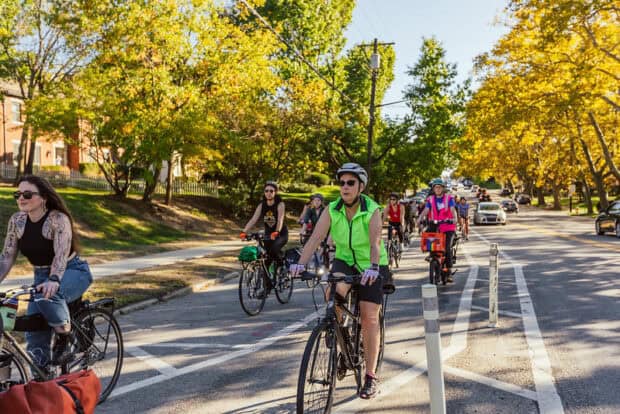
BikePGH is looking to further understand how gender identity and aggressive behavior create obstacles to cycling
Mobility Justice is at the core of BikePGH’s mission. When we work to transform streets to make biking and walking commonplace for all Pittsburghers, it improves the quality of life not only for individuals but our greater community.
But what happens when people of marginalized gender identities (women, trans, and nonbinary people) don’t feel safe to utilize active transportation options like biking or walking? According to the US Census, only 32% of Pittsburgh bike commuters identify as women. In truly bike-friendly cities, that number is much closer to 50%.
People of marginalized gender identities face unique challenges when it comes to cycling. Women, trans, and nonbinary people experience a higher rate of street harassment, aggressive and dangerous driving, and other demeaning interactions and behaviors that could prevent them from feeling safe and comfortable using a bicycle for daily trips.
Inspired by both London Cycling Campaign and BikeLoudPDX, BikePGH is embarking on a survey to better understand barriers to cycling for women, trans, and nonbinary people in Pittsburgh. Both previously conducted surveys yielded disheartening takeaways in not only the volume of harassment, demeaning behavior, and dangerous driving but also in the impact it had on individuals and how it affected their transportation choices.
Knowing London and Portland are very different cities than Pittsburgh, we were inspired to launch our survey to gather insight and experience from our friends and neighbors. We’re trying to figure out what keeps some people from riding to better address these issues head on.

Who is this Survey For?
Open until April 2nd, 2025, this BikePGH survey, Gender Identity and Barriers to Cycling in Pittsburgh, is open to women, trans, and nonbinary people in the greater Pittsburgh area. The survey is 22 questions and will take about 10 minutes to complete. It is intended for people who bike regularly, people who seldom bike, and perhaps, most importantly, people who want to bike but currently don’t.
We encourage you to share as much as you are willing with us so we can have a more complete picture of the obstacles and challenges people of marginalized gender identities face while bicycling.
Keep an eye out – we will be publishing our findings from this survey in late April 2025.